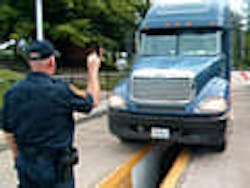Insurance providers say truck fleets should not be overly concerned about the impact of the Federal Motor Carrier Safety Admin.’s (FMCSA) new Compliance- Safety- Accountability (CSA) program on their premiums. That’s largely because, the insurance carriers point out, that CSA scores count only as one among many factors that determine how motor carrier premiums are calculated.
“CSA is only one more tool in tool box for analyzing risk; it does not replace anything,” said David Parker, senior legal counsel for Great West Casualty Co., during a panel presentation at this week’s 2011 Truckload Carriers Assn. meeting in San Diego.
“CSA is also still something of an unknown as it remains a work in progress,” he added. “FMCSA is still evaluating the algorithms it uses to calculate scores, and we expect CSA to undergo further changes in the future.”
Parker and other panelists also contended that insurance providers still put more weight on what they consider “traditional” methods of evaluating motor carrier risk, such as driver motor vehicle records (MVRs), accident history and the most critical factor of all, past claims/loss experience.
Carriers should focus on far more fundamental pieces of their business from an insurance perspective, Parker stressed. Having good equipment, experience, profitability, financial stability and honest dealings with insurance field agents can go a long way towards lowering their risk profile than using CSA scores alone, he explained.
“A carrier’s reputation is still a major item in our calculations,” said Parker.
Mike Natalizio, president & CEO of insurance giant HNI’s Truck Group, said that in his view, CSA represents the biggest change to trucking since deregulation. That’s because in the future, as CSA rules and metrics are ironed out, the program should develop solid performance data that will indicate the direction of a carrier’s risk profile.
“The problem with most of our metrics today – such as accident history and loss experience – is that we get the data after a negative event has occurred; they are lagging indicators,” he explained. “We need to get ahead of such negative events-- to find information that can reliably predict whether the risk is rising or falling that a carrier could have a negative experience.”
So, while CSA right now won’t have a huge impact on insurance premiums, once its performance metrics are solidly established and those metrics are combined with other safety data, the new safety regime will play a much bigger role, said Steve Johnson, president & CEO of Marvin Johnson & Associates.
“CSA isn’t really going to affect insurance outcomes until loss data is tied directly and accurately to its scores,” he stated. “Right now, scoring isn’t consistent. It will take three to five years worth of accumulated CSA data to really see how good of a predictive tool it can be. We’re only just starting to input this information; it will take time to aggregate and properly analyze CSA data.”
About the Author
Sean Kilcarr
Editor in Chief
Sean Kilcarr is a former longtime FleetOwner senior editor who wrote for the publication from 2000 to 2018. He served as editor-in-chief from 2017 to 2018.
